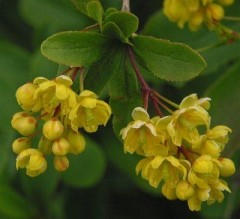BERBERINE, SUBSTANCE WITH MANY BIOACTIVITY
Supplements Berberine

There are numerous studies and works that demonstrate the properties of Berberine: there are over 500. Berberine is the fact one of the most studied natural molecules ever. Why is that?
The plant alkaloid berberine is a bitter taste and an intense yellow color, present in the bark, roots and stems of plants belonging to the genus Berberis, such as barberry (Berberis vulgaris L.).
Used for centuries in traditional Chinese medicine, the Berberine, has recently attracted increasing interest on its bioactivity numerous: as an antioxidant, antimicrobial, anti-cancer, cardiovascular protective,anti-diabetic, neuroprotective, anti-obesity, hepatoprotective, gastrointestinal protective, anti-rheumatic, with anti-angiogenic and anti-clastogenic.
The multiplicity of beneficial actions, the ability to operate at multiple levels and the absence of significant side effects, contribute to make the berberine one of the supplements most interesting of the moment, on which research is being focused by many scholars.
The cholesterol-lowering properties
In 2004, the study published in Nature Medicine by Kong, Wei J, Abidi et al. (Berberine is a novel cholesterol-lowering drug working through a unique mechanism distinct from statins) showed: berberine, taken orally by 32 hypercholesterolemic patients for three months, reduced plasma cholesterol by 29%, triglycerides by 35% and LDL cholesterol by 25%. Data may suggest that berberine as a possible natural alternative to statins.
Hypoglycaemic properties
There are two types of diabetes mellitus, diabetes type 1, represented almost entirely by the shape immune-mediated (ie mediated by dysregulation of the immune system of the subject), and the type 2 diabetes, a chronic metabolic disease with the characteristics of insulin resistance, hyperglycemia, hyperlipidemia, and serious complications. Has recently been shown that berberine has a protective effect in both types of diabetes due to its action for the protection of cells, regulation of glucose and sugar metabolism.
The berberine can also reduce insulin resistance, typical of type 2 diabetes.
The antioxidant properties
Oxidative stress, as we know, is involved in the pathophysiological process of many chronic inflammatory and degenerative diseases. The generation of reactive oxygen species (ROS) can damage DNA, proteins and cells, and play an important role in the progression of the disease. Natural antioxidants, such as polyphenols from medicinal plants can strengthen the antioxidant defense system. Berberine has been reported to have high antioxidant capacity and protection of cells against oxidative damage.
The anti-obesity
The berberine may also be useful in the fight against obesity: according to multiple studies, in fact, it could inhibit adipogenesis, namely the development and regulation of adipocytes, the cells of adipose tissue.
For more details, read the study
Supplements Berberine
